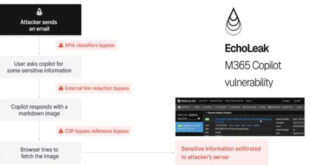Hackers are exploiting an unauthenticated remote code execution vulnerability in the Samsung MagicINFO 9 Server to take control of devices and install malware.
The server allows file uploads to update display content, but hackers are using this feature to upload malicious code.
By infosecbulletin
/ Wednesday , June 18 2025
Russian cybersecurity experts discovered the first local data theft attacks using a modified version of legitimate near field communication (NFC)...
Read More
By infosecbulletin
/ Tuesday , June 17 2025
Cybersecurity researcher Jeremiah Fowler discovered an unsecured database with 170,360 records belonging to a real estate company. It contained personal...
Read More
By infosecbulletin
/ Tuesday , June 17 2025
GreyNoise found attempts to exploit CVE-2023-28771, a vulnerability in Zyxel's IKE affecting UDP port 500. The attack centers around CVE-2023-28771,...
Read More
By infosecbulletin
/ Tuesday , June 17 2025
The U.S. Cybersecurity and Infrastructure Security Agency (CISA) has recently included two high-risk vulnerabilities in its Known Exploited Vulnerabilities (KEV)...
Read More
By infosecbulletin
/ Monday , June 16 2025
SafetyDetectives’ Cybersecurity Team discovered a public post on a clear web forum in which a threat actor claimed to have...
Read More
By infosecbulletin
/ Sunday , June 15 2025
WestJet, Canada's second-largest airline, is looking into a cyberattack that has affected some internal systems during its response to the...
Read More
By infosecbulletin
/ Saturday , June 14 2025
Resecurity found 7.4 million records of Paraguayan citizens' personal information leaked on the dark web today. Last week, cybercriminals attempted...
Read More
By infosecbulletin
/ Friday , June 13 2025
HashiCorp has revealed a critical vulnerability in its Nomad tool that may let attackers gain higher privileges by misusing the...
Read More
By infosecbulletin
/ Friday , June 13 2025
SoftBank has disclosed that personal information of more than 137,000 mobile subscribers—covering names, addresses, and phone numbers—might have been leaked...
Read More
By infosecbulletin
/ Friday , June 13 2025
Serious security vulnerabilities in Trend Micro Apex One could allow attackers to inject malicious code and elevate their privileges within...
Read More
The flaw identified as CVE-2024-7399 was publicly disclosed in August 2024 and fixed in version 21.1050.
The vendor describes a vulnerability in Samsung MagicINFO 9 Server as an “Improper limitation of a pathname to a restricted directory,” which allows attackers to write arbitrary files with system authority.”
On April 30, 2025, security researchers at SSD-Disclosure published detailed information and a demonstration exploit that allows remote code execution on the server without needing to log in, using a JSP web shell.
The attacker uploads a malicious .jsp file through an unauthenticated POST request, using a vulnerability to place it in a publicly accessible location.
By visiting the uploaded file, they can run commands on the operating system and view the results in the browser.
Arctic Wolf now reports that the CVE-2024-7399 flaw is being actively exploited just days after the PoC’s release, showing that attackers have started using the disclosed method in real attacks.
“Given the low barrier to exploitation and the availability of a public PoC, threat actors are likely to continue targeting this vulnerability,” warned Arctic Wolf.
Another confirmation of active exploitation comes from threat analyst Johannes Ullrich, who reported seeing a Mirai botnet malware variant using CVE-2024-7399 to take over devices.
System administrators should quickly fix CVE-2024-7399 by upgrading the Samsung MagicINFO Server to version 21.1050 or later.
 InfoSecBulletin Cybersecurity for mankind
InfoSecBulletin Cybersecurity for mankind














